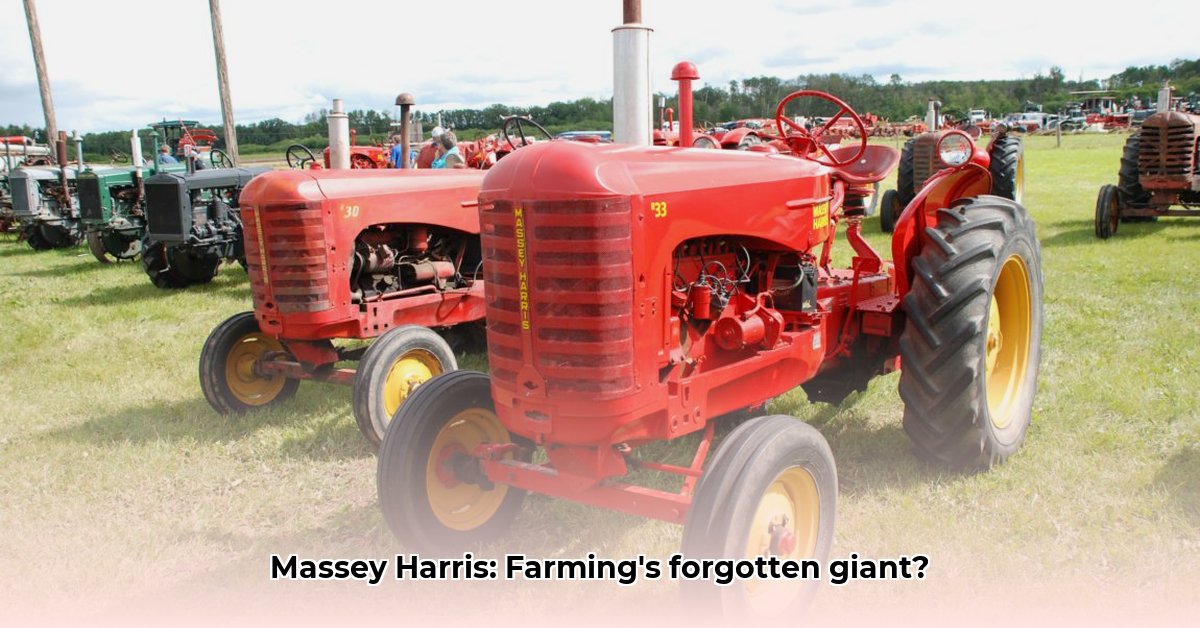
The Massey Harris tractor—a name synonymous with agricultural revolution—holds a fascinating place in history. Its story is one of ingenuity, hard work, and a profound, albeit indirect, impact on modern farming practices and the ongoing quest for sustainable agriculture. This isn't simply a historical account; it's an exploration of how this iconic brand shaped our relationship with food production, highlighting both its transformative advancements and unforeseen environmental consequences. For more on early models, see this Massey Ferguson Tractor.
A Century of Innovation on the Farm
The Massey Harris narrative unfolds as a compelling tale of entrepreneurial spirit and technological advancement. Originating relatively modestly, the company quickly ascended to become a dominant force in agricultural technology. Early models, though groundbreaking for their time, were continuously refined. Each iteration incorporated new engine technologies and design improvements, consistently pushing the boundaries of performance and efficiency. The transition from horse-drawn plows to the powerful Massey Harris tractor represented a monumental leap in agricultural productivity, fundamentally altering farming practices and the very fabric of rural communities.
This relentless pursuit of innovation was further fueled by strategic mergers and acquisitions. The pivotal union with Harry Ferguson, resulting in the formation of Massey Ferguson, propelled the brand onto the global stage, expanding its influence far beyond its Canadian origins. This journey, however, wasn't without its challenges; navigating a competitive marketplace and ensuring sustained success demanded adaptability and a keen understanding of shifting market demands.
The Double-Edged Sword of Progress
While Massey Harris tractors undoubtedly revolutionized farming, increasing yields and dramatically reducing labor, their impact on the environment warrants careful consideration. Increased mechanization, though boosting efficiency, also led to higher fuel consumption and, in certain instances, soil compaction. The narrative here is not a simple dichotomy of good versus evil; it's a multifaceted story of progress and its unintended consequences. While we cannot directly attribute climate change to Massey Harris tractors, their role in enabling more intensive farming practices cannot be ignored. This highlights the inherent trade-offs that often accompany technological breakthroughs.
"The increased efficiency offered by Massey-Harris tractors was undeniably a boon to agricultural productivity," notes Dr. Emily Carter, Professor of Agricultural History at the University of Alberta. "However, the long-term environmental consequences, such as increased fuel consumption and potential soil degradation, require careful analysis in the context of the time."
Building a Sustainable Future: Lessons from the Past
The Massey Harris legacy continues to inform our approach to sustainable agriculture. It serves as a compelling case study, illuminating both the benefits and the drawbacks of mechanized farming. While the machines themselves didn't directly address environmental concerns, their historical context provides invaluable lessons. The advancements in engine efficiency and productivity achieved by Massey Harris continue to inform the development of more environmentally responsible agricultural machinery.
AGCO, the current owner of the Massey Ferguson brand, actively pursues sustainable technologies, investing in research and development to create fuel-efficient and environmentally friendly equipment. This demonstrates a commitment to mitigating the potential negative impacts of past practices and building a more sustainable future. Isn't it fascinating how a company's past can inform its present and shape its future?
How Did Massey-Harris Tractors Impact Sustainable Farming Practices?
Massey-Harris tractors dramatically altered agricultural practices, leading to both significant advancements and unintended consequences for sustainable farming.
The Mechanization Revolution and its Ripple Effects
The shift from horse-drawn implements to powerful tractors, spearheaded by Massey-Harris, was transformative. Their innovations, such as the self-binding reaper, revolutionized harvesting efficiency. However, this mechanization also facilitated the rise of large-scale monoculture farming, potentially impacting soil health and biodiversity. The initial impact on sustainability was, therefore, indirect—a complex interplay of increased yields and potentially adverse environmental effects.
A Legacy of Innovation: Balancing Progress and Sustainability
While Massey-Harris's primary focus was on increasing yield and efficiency, their contributions inadvertently shaped modern agriculture. Their influence on the adoption of intensive farming methods, sometimes leading to soil degradation, cannot be overlooked. However, this legacy also laid the groundwork for future innovations aimed at minimizing environmental impact. The long-term consequences are still being assessed, but the initial impacts were undeniable.
The Evolution Towards Modern Sustainability
The Massey Ferguson merger and subsequent acquisition by AGCO marked a shift towards sustainability integration. Today, AGCO's commitment to precision farming and fuel-efficient technologies reflects a conscious effort to address the historical challenges and build a more environmentally responsible future. This evolution showcases how legacy companies can adapt and contribute to broader sustainable goals.
Key Takeaways: A Complex Legacy
- Massey-Harris's mechanization revolutionized agricultural efficiency, but with unforeseen environmental trade-offs.
- Large-scale farming, facilitated by these innovations, impacted soil health and biodiversity.
- Modern AGCO, the successor, actively pursues sustainable agriculture through precision farming.
- Studying the Massey-Harris legacy offers crucial insights into the complexities of sustainable agriculture.
The Massey Harris story underscores the ongoing challenge of balancing economic progress with environmental stewardship. It's a narrative of innovation, unintended consequences, and the continuous evolution of our relationship with the land. By understanding its complete legacy, we can better navigate the path toward a more sustainable agricultural future.